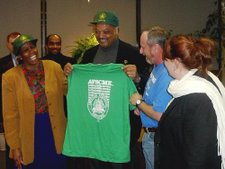
A glistening wind turbine stands outside the
Great Lakes Science Center in
Cleveland -- the city where the world's first electricity-generating windmill was built in 1888. The new machine weighs 26 tons and has kept 40,000 pounds of climate-changing carbon dioxide emissions out of the atmosphere.
Gazing skyward, United Steelworkers president Leo Gerard was impressed. "Twenty-six tons!" he marveled, mentally calculating how many manufacturing jobs that equaled -- before he learned that this particular machine was built in Denmark. "That seems pretty dumb," Gerard said. "We figure out how to make it work. And then someone in another country makes something of it and ships it back to us."
The scene occurred last fall, when Gerard was on a three-day, three-state barnstorming tour with Sierra Club executive director Carl Pope. They encouraged elected officials to support wind and solar power and energy efficiency as ways of creating jobs, pumping up the U.S. economy, and fighting global warming.
Gerard's United Steelworkers union has been fighting for clean workplaces and communities since the 1960s. It helped pass landmark U.S. legislation regulating air and water pollution and toxic waste, as well as "right-to-know" laws, which require companies to tell the public how much pollution they are releasing. "We need to put an end to the lies, the myths, the hysteria, that say you can have either a clean environment or good jobs," Gerard says. "You can have both, or you have neither."
Gerard's father belonged to a miners' union and held shop-steward meetings in the family basement. He describes himself as an "irreverent" youngster, impatient with high school. "The stuff they were teaching me was how to have a good memory. I resented the system because I thought it marginalized people," he says.
Gerard was elected as United Steelworkers president in 2001, and the irreverent kid who had yearned to become an economics professor was in a position to change the economic future of North America. The union is deeply engaged in the key issues facing workers: healthcare, pensions, and "offshoring," the trend toward moving North American industries and jobs overseas. It is also working for broader, longer-term goals such as worldwide standards to protect industrial workers, worker-friendly pension-fund investments, and the union's ground-floor membership in what the Steelworkers see as North America's emerging clean-energy economy.
While promoting the union's causes, Gerard can be intimidating. Once when it was his turn to speak at a steel company's shareholder meeting, the lights suddenly went out. "This is no time to be f -- -ing with the lights," he barked. "Get them back on or somebody's going to beat the sh -- out of you." Suddenly the room brightened, and Gerard was able to say his piece.
On the first day of their clean-energy tour, Gerard and Pope met with media, workers, environmentalists, and the Twin Cities mayors at the United Auto Workers Hall in St. Paul. Across the street is the sprawling plant that once provided 2,000 high-paying jobs making Ford Ranger pickups. Ford turned down workers' entreaties to convert it to building high-mileage hybrid vehicles and announced the plant's closure in 2008. Gerard was not pleased. "Don't tell me that a car made in America can't get 30 or 40 or 50 miles per gallon," he said. Gerard and Pope's appearance made the local papers that day, as did the alternative they support: converting the old Ford plant into a wind tower and turbine factory.
Although the barnstorming tour focused on clean-energy jobs of the future, the union is still working hard to clean up existing workplaces. "Roughly 60,000 workers die each year in this country from workplace accidents or from diseases caused by workplace chemicals," says union environmental specialist Diane Heminway.
In 1990, the Steelworkers published a 34-page manifesto called "Our Children's World." Its message was simple: "We cannot protect Steelworker jobs by ignoring environmental problems." Ahead of its time, the report also warned of the "catastrophic consequences" of global warming. When the document was presented at the Steelworkers' annual meeting, it was not an easy sell.
"We don't say there is never a jobs-versus-environment conflict," says Michael Wright, the Steelworkers' director of health, safety, and environment. "Conflicts may exist, but fighting cleanups is not the way to solve them. Our job is to find solutions that protect both jobs and the environment."
More recently, the union's environmental policies have been questioned by some members of the Paper, Allied-Industrial, Chemical and Energy Workers International Union (PACE), which merged with the Steelworkers in 2005. Paper workers, including loggers and mill workers, are still smarting over environmentalists' efforts to protect the spotted owl in the Pacific Northwest in the 1980s. They don't think much of the Sierra Club's stand against commercial logging in national forests either.
Gerard is undaunted by such squabbles. "We aren't going to be united with the environmental movement on every issue," he says. "But we are going to be united 80 or 90 percent of the time. Let's work on that unity rather than let our enemies exploit the divisions."
Gerard's dream of a thriving U.S. clean-energy industry has moved a few steps closer to reality. He is not surprised. "We are not promoting some kind of fuzzy, left-wing, feel-good stuff that Rush Limbaugh will love to attack," he says. "This is sound social and economic policy. This gives my grandkids a shot."
Excerpted from "Union Heavy Embraces Green Energy as Crucial Vision for the Future," by Joan Hamilton, Sierra Magazine












